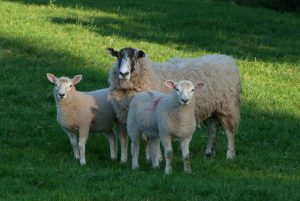
Little lamb, who made thee?
Dost thou know who made thee,
Gave thee life, and bade thee feed
By the stream and o’er the mead
Gave thee clothing of delight,
Softest clothing, woolly, bright;
Gave thee such a tender voice,
Making all the vales rejoice?
Little Lamb, who made thee?
Dost thou know who made thee?
– William Blake
Many of us are familiar with the shepherding analogies of the Bible, from the shepherd boy David penning the 23rd Psalm, to Jesus’ telling the parable of the good shepherd who searches for the one lost sheep.
Human beings have often been compared to sheep, because we exhibit so much of the same behaviour, tending to flock together, often heedless and helpless in the face of danger, and in need of provision. But one thing sheep do possess, and that is an instinctive knowing of their shepherd’s voice. A friend who once raised sheep on the family farm testified to that, saying that her husband could call the sheep from a faraway field and they would come, but that they would totally ignore her.
In Matthew 25, Jesus pictures Judgment Day as a process similar to that of a shepherd separating the sheep from the goats. My knee-jerk reaction sometimes saw that as discrimination. Certainly, we love our little kid goats, too – our family farm included Susie, the goat, a curious and playful and resourceful creature. But goats and sheep are different in personality, with different food needs, vulnerable to different diseases and hazards.
Jesus’ parable was perhaps not so much about sheep and goats themselves but to show that these natures are clearly distinguishable: the criteria would be based on our treatment of others. When we ignore the needy we are distancing ourselves from our own intrinsic humanity. How we react when we see others hungry, or thirsty, in need of clothing or hospitality or in prison is crucial. Our response is given as if to Jesus himself, who loves his sheep like a shepherd.
Pastoral care is also that kind of shepherding, alert to the straying ones, using the oil of kindness to assuage the wounded ones, giving direction by being that orienting voice that leads them, searches for and provides for their spiritual nourishment. Especially in times of social distancing, it is important that people can hear their leader’s voice, and that leaders have a sense of where people are.
Every day, a shepherd would call out his sheep from the fold, to set out for the pasture. Unless we recognize the Shepherd’s voice, admit his leadership for both our unique and our common humanity, we cannot resource the provision God has made for humanity. And God’s greatest providence has been the life of his Son, the great Shepherd who became the sacrificial lamb.
We are beginning the season of Advent. Over two thousand years ago, Jesus was born in a stable in Bethlehem, the place near Jerusalem where the sacrificial lambs for the temple were kept. Mary may very well have taken the strips the shepherds used to wrap baby lambs to help keep her newborn warm. It was the angel’s sign to the awed shepherds, so that they would recognize the Messiah. The Lamb of God and the Great Shepherd in one very seemingly tiny, vulnerable human being.
Little Lamb, I’ll tell thee,
Little Lamb, I’ll tell thee;
He is called by thy name,
For He calls Himself a Lamb.
He is meek, and He is mild;
He became a little child.
I a child, and thou a lamb,
We are called by His name.
Little Lamb, God bless thee!
Little Lamb, God bless thee.
– William Blake